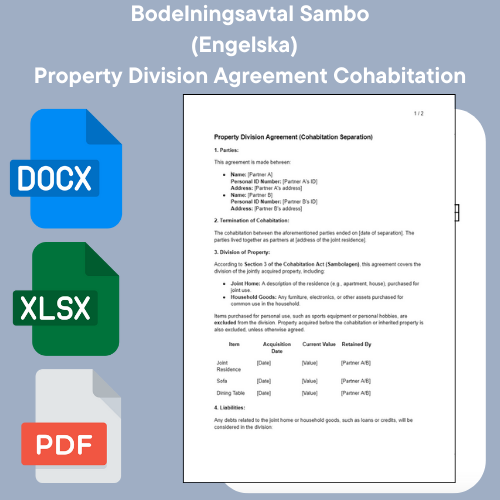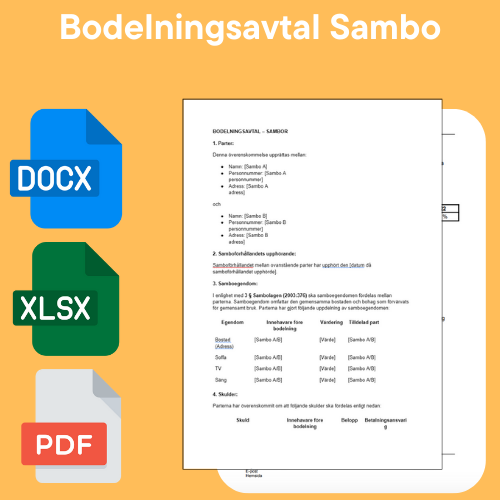Comprehensive Guide on Property Division Agreements and Divorce
Share
Comprehensive Guide on Property Division Agreements and Divorce
Table of Contents
- What is a property division agreement?
- When should property division be done?
- The process of property division
- Legal Aspects
- Practice and Examples
- Special cases
- Important Tips
- Conclusion
What is a property division agreement?
A property division agreement is a legal document in which two spouses or cohabitants regulate how their joint property is to be distributed in the event of separation or divorce. The division of property includes all matrimonial property, which is the property that is not separated by prenuptial agreement, will or gift.
When should property division be done?
Property division can be carried out both during an ongoing marriage and in case of divorce. If the division of property is made during the marriage without connection to a divorce, notification of this must be registered with the Tax Agency. In case of divorce, the property division should be done in close connection with the divorce to avoid future disputes.
The process of property division
Division of Property:
- Each spouse lists their property and debts.
- Property that must be included in the division of property is matrimonial property, while individual property is exempt.
- The value of the matrimonial property is divided equally between the spouses.
Distribution of assets:
- After listing and valuing assets and liabilities, each spouse's share is determined.
- If one spouse has property of a higher value, he must compensate the other spouse financially for the difference.
- Special assets such as homes and vehicles may require approval from external parties, such as banks and housing associations, for a transfer to be valid.
Formalization of the property division:
- A written property division agreement is drawn up and signed by both parties.
- The agreement can be registered with the Tax Agency, which is often recommended to give the agreement legal effect.
Legal Aspects
The Marriage Code
Property division is primarily regulated by the Marriage Code (1987:230). According to this law, all matrimonial property must be divided equally between the spouses in the event of a divorce, unless otherwise agreed in a prenuptial agreement.
The joint ventures
For cohabitants, the Cohabitation Act (2003:376) applies, which stipulates that only cohabitation property, i.e. housing and household goods acquired for joint use, is included in the division of property. A cohabitant must request property division within one year of the separation.
Practice and Examples
In practice, the property division process can vary depending on the circumstances. If the spouses agree on how the assets are to be distributed, they can draw up a property division agreement themselves. If there is disagreement, a property division executor can be appointed by the district court.
An executor can call the parties to meetings, collect the necessary information and draw up a list of assets and liabilities in order to make a decision on the distribution.
Special cases
Property division in case of death:
In the event of death, a division of the estate must be made before the probate proceeding begins, unless the surviving spouse is the sole heir.
Property division during the Marriage:
Property division can also take place during marriage for reasons such as transferring assets or protecting a spouse when starting a business.
Important Tips
Write Agreement in Advance: It can be beneficial to write a preliminary agreement on property division before an upcoming divorce. This may facilitate the process later.
Help from a lawyer: It may be wise to hire a lawyer to ensure that the property division agreement is correctly and fairly drafted.
Conclusion
The property division agreement is a central part of the divorce process, which aims to distribute the joint property of the spouses in a fair way. By understanding the legal framework and preparing well, the parties can avoid many conflicts and ensure a smooth transition.
On our website, you can easily and safely download property division agreement document templates, tailored to meet all legal requirements and ensure a fair distribution of assets.




